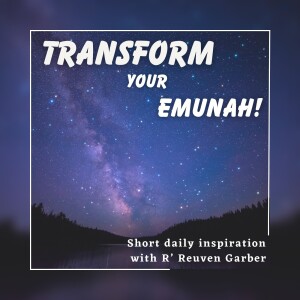
Monday Feb 17, 2025
264 - Olam Haba (Part-8)
We've been discussing how there are many concepts that are often thrown out such as Moshiach, Olam Haba, Gehinnnom, Gan Eden, and the like. And it is worthwhile to break down each of the segments to understand better what is in store for us. As we've discussed, when our neshamah leaves our body, if it is necessary, there is a process called chibut hakever, where a person has to undergo suffering in its burial place. Thereafter, the soul, our neshamah, makes its way up to what is called by the Ramban, the Kabbalists, and the most accepted view by the Torah authorities, the olam haneshamos, the world of the souls.
According to the Ramban, the Kabbalists, and most Torah authorities, Olam Haba, our eternal address, is a different place to olam haneshamos, the world of souls. The world of souls is almost like a waiting room for the next part of the story to happen. And in the world of souls is where we have both Gehinnom and Gan Eden, sometimes called hell and heaven. Let's continue the breakdown of the process as discussed by Torah authorities. At some point, when Hashem decides it's right, either because the Jewish people who will be alive at the time will earn it, or just because Hashem decides that this is the right time, we will merit the coming of Moshiach. The coming of Moshiach will be an experience for all those people that will be alive in the world at that time. As opposed to if one has already passed on and is now in the waiting room, in the world of souls, then they will not experience the coming of Moshiach.
There is a discussion in the Gemara which is brought down by many Torah authorities, such as the Rambam, in Hilchos Melachim Umilchamos, chapter 12, as to what exactly is going to transpire at Moshiach's arrival. Some hold that the world will then operate in a completely supernatural manner, such as that we will have the Beis Hamikdash falling down from heaven, and many other similar miracles. Whereas other opinions hold that the world will then function in a similar manner to how it does today, such as we will have to go ourselves and build the Beis Hamikdash, using the same building techniques that we do today. However, there will be two major differences. One will be that all the nations of the world will be subjugated to the Jewish people, and there will be absolute peace in the world. And secondly, that all the people of the time will have a tremendous desire to just do mitzvahs and serve Hashem as much as possible, as opposed to today, where we have a tremendous evil inclination to transgress, even though we might know what is right.
If one is interested in studying about the Messianic era, there is much Torah literature available to be able to investigate the topic further. However, as the Rambam writes, even if one were to find seeming contradictions between different statements in Torah passages about exactly what is going to transpire in the times of Moshiach, one shouldn't pay too much attention to that, because at the end of the day, we don't know exactly how it's going to play out, until it actually plays out. There are people who work on finding codes in the Talmud and Torah in general to try to find hints to when exactly Moshiach is going to come. It would seem from the Rambam that he was not particularly in favor of doing so, because in a sense, it's wasting one's time, because only Hashem knows when Moshiach is going to come, and that is not our job nor business to get involved in.
What is our job, however, is to fulfill the mitzvah that is one of the 13 principles of faith, to instill the belief in ourselves that Moshiach can come at any single moment, and even if he'll delay and he didn't come yesterday, nor for the last thousand years, today might just be the day. And as we've learned, those neshamas that have already passed on will not merit to be present for the coming of Moshiach, because the coming of Moshiach is something that happens in this world for the people who will be alive then. The concept of techias hameisim, the resurrection of the dead, is something that occurs at a later stage, and we'll discuss that further in future, Bezrat Hashem. So how much more so then, should we all daven, "ani maamin beeumah sheleimah bevias hamashiach v'af al pi sheismahamea im kol ze achakeh lo bechol yom sheyavo."
No comments yet. Be the first to say something!